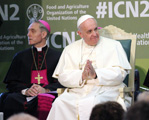Participants endorsed the Rome Declaration on Nutrition and an accompanying technical Framework for Action to guide the Declaration's implementation, at the Second International Conference on Nutrition (ICN 2).
The conference was jointly organized by the Food and Agriculture Organization of the UN (FAO) and the World Health Organization (WHO).
 21 November 2014: Participants endorsed the Rome Declaration on Nutrition and an accompanying technical Framework for Action to guide the Declaration’s implementation at the Second International Conference on Nutrition (ICN 2). The conference was jointly organized by the Food and Agriculture Organization of the UN (FAO) and the World Health Organization (WHO).
21 November 2014: Participants endorsed the Rome Declaration on Nutrition and an accompanying technical Framework for Action to guide the Declaration’s implementation at the Second International Conference on Nutrition (ICN 2). The conference was jointly organized by the Food and Agriculture Organization of the UN (FAO) and the World Health Organization (WHO).
As noted by the Earth Negotiation Bulletin, ICN 2 marked the first time in the 21st century that the global community convened in an intergovernmental process to discuss nutrition, and was notable also for recognizing that improving nutrition goes beyond reducing poverty and hunger.
FAO Director-General José Graziano da Silva described the Conference as “the beginning of our renewed effort,” and called for bold actions to ensure adequate nutrition for all. “The political commitments made at ICN2 – the first to include solutions that will address malnutrition in all its forms, from hunger to obesity – are landmark,” said Oleg Chestnov, WHO.
ICN 2 consisted of plenary sessions where participants heard statements by His Holiness Pope Francis and Queen Letizia of Spain, among others. Roundtables convened on: nutrition in the post-2015 development agenda; governance and accountability for nutrition; and policy coherence for nutrition, including coherence between economic policies and healthy diet changes.
The outcome Declaration, which was adopted on the first day of ICN 2, reaffirms that everyone has the right to access safe, sufficient, and nutritious food, consistent with the right to adequate food and the fundamental right of everyone to be free from hunger, and that the elimination of malnutrition is imperative for health, ethical, political, social and economic reasons. It notes malnutrition not only affects people’s health and well-being but also poses a high burden in the form of socioeconomic consequences to States. The Declaration recognizes that: official development assistance (ODA) for nutrition should complement national nutrition strategies, policies and programmes; the right to food is fostered through sustainable, equitable, accessible resilience and diverse food systems; and governments should protect consumers, especially children, from inappropriate marketing and publicity of food.
The Declaration outlines ten commitments on, inter alia: eradicating hunger and preventing all forms of malnutrition; reversing rising trends in overweight, obesity and diet-related non-communicable diseases (NCDs); enhancing sustainable food systems by developing coherent public policies from production to consumption; empowering people to make informed food choices; and raising the profile of nutrition.
The voluntary Framework for Action provides a list of 60 policy and strategy recommendations for governments. Recommendations address: enabling environments; sustainable food systems; international trade and investment; food waste; nutrition education and information; social protection, including using cash and food transfers and school meal programmes; and water sanitation and hygiene (WASH), including committing to achieve universal access to safe drinking water. Recommendations also focus on, inter alia: childhood stunting, overweight and obesity; promoting, protecting and supporting breastfeeding; anemia in women of reproductive age; and strong and resilient health systems, including universal health coverage.
The Framework encourages governments to establish nutrition targets, consistent with the time frame for implementation (2016-2025) and global nutrition and NCD targets established by the World Health Assembly (WHA). To support governments in translating ICN 2 commitments into action, FAO established the Action for Nutrition Trust Fund. The Fund will also support countries to build monitoring mechanisms to monitor their progress on nutrition commitments.
Over 2,200 participants attended ICN2, which convened under the theme, “Better Nutrition, Better Lives.” It took place at FAO Headquarters in Rome, Italy, from 19-21 November 2014. [IISD RS Coverage of ICN 2] [FAO Press Release] [UN Press Release] [Rome Declaration on Nutrition] [Framework for Action] [Action for Nutrition Trust Fund]